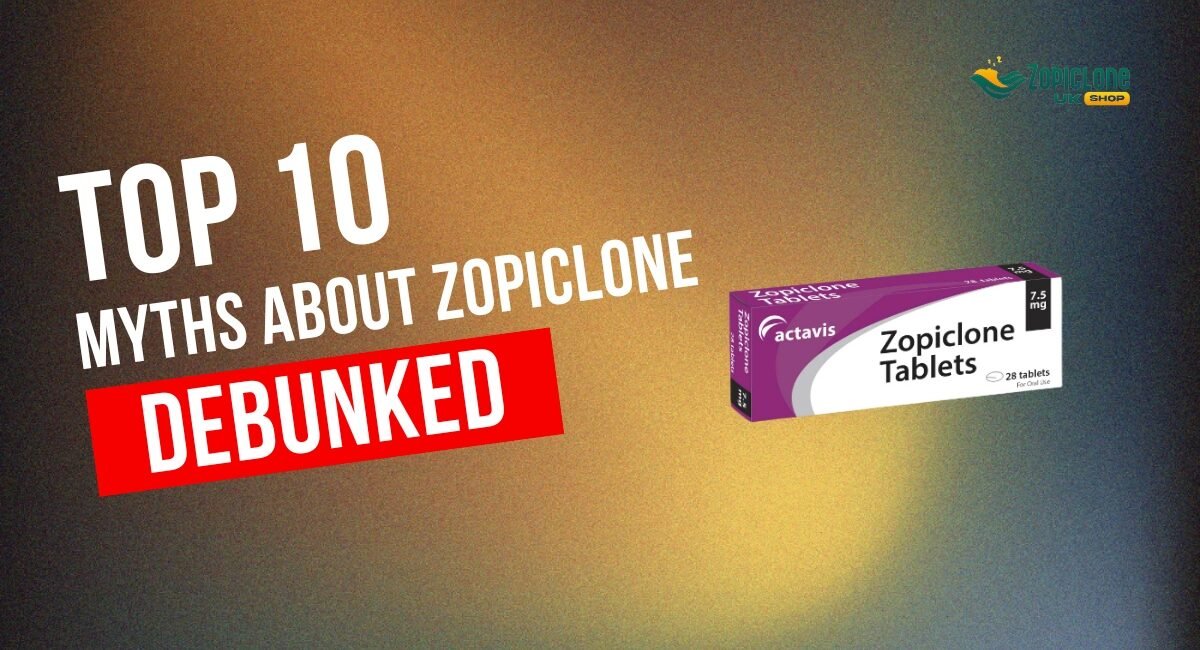Zopiclone is a widely prescribed medication for treating insomnia, but it’s often surrounded by misconceptions and misinformation. Whether you’re considering using Zopiclone or are already taking it, it’s important to separate fact from fiction. In this article, we’ll debunk 10 common myths about Zopiclone, helping you make informed decisions about your health.
- Myth 1: Zopiclone Is Completely Safe for Everyone
- Myth 2: Zopiclone Works Instantly Every Time
- Myth 3: Zopiclone Is Addictive for Everyone
- Myth 4: Zopiclone Can Cure Insomnia Permanently
- Myth 5: You Can Stop Zopiclone Abruptly Without Any Issues
- Myth 6: Zopiclone Is the Same as Benzodiazepines
- Myth 7: Zopiclone Is Safe to Mix with Alcohol
- Myth 8: Zopiclone Is Only for Severe Insomnia
- Myth 9: Zopiclone Has No Long-Term Side Effects
- Myth 10: You Can Buy Zopiclone Online Without a Prescription
- Conclusion
Myth 1: Zopiclone Is Completely Safe for Everyone
Reality: While Zopiclone is effective for treating insomnia, it’s not suitable for everyone. Like any medication, it comes with potential risks and side effects. Common side effects include dizziness, dry mouth, and a metallic taste. In some cases, it can cause more severe reactions like memory problems or allergic reactions.
Zopiclone is also not recommended for people with certain medical conditions, such as severe liver disease or respiratory issues. Always consult your doctor before starting Zopiclone to ensure it’s safe for you.
Myth 2: Zopiclone Works Instantly Every Time
Reality: Zopiclone is designed to help you fall asleep faster, but its effectiveness can vary from person to person. Factors like your metabolism, the severity of your insomnia, and whether you take it on an empty stomach can influence how quickly it works.
For some, it may take 20-30 minutes to feel drowsy, while others might need longer. It’s also important to take Zopiclone exactly as prescribed—taking more than the recommended dose won’t make it work faster and can be dangerous.
Myth 3: Zopiclone Is Addictive for Everyone
Reality: Zopiclone has the potential for dependency, but not everyone who takes it will become addicted. The risk of addiction increases with long-term use or misuse, such as taking higher doses than prescribed.
To minimize the risk, Zopiclone is typically prescribed for short-term use (2-4 weeks). If you’re concerned about dependency, talk to your doctor about alternative treatments or a gradual tapering plan.
Myth 4: Zopiclone Can Cure Insomnia Permanently
Reality: Zopiclone is not a cure for insomnia—it’s a temporary solution to help you sleep. Insomnia is often caused by underlying issues like stress, anxiety, or poor sleep habits. Relying solely on Zopiclone without addressing these root causes won’t solve the problem in the long term.
For lasting relief, consider combining Zopiclone with lifestyle changes, such as improving sleep hygiene, reducing caffeine intake, or practicing relaxation techniques.
Also Read: Why Zopiclone May Not Work After 2 Hours: Causes and Solutions
Myth 5: You Can Stop Zopiclone Abruptly Without Any Issues
Reality: Stopping Zopiclone suddenly, especially after prolonged use, can lead to withdrawal symptoms like rebound insomnia, anxiety, and irritability. To avoid these issues, it’s important to taper off the medication gradually under medical supervision.
If you’re planning to stop taking Zopiclone, work with your doctor to create a safe and effective plan.
Myth 6: Zopiclone Is the Same as Benzodiazepines
Reality: While Zopiclone works similarly to benzodiazepines by enhancing the effects of GABA (a calming neurotransmitter), it belongs to a different class of drugs called non-benzodiazepine hypnotics. This means it has a slightly different chemical structure and may have fewer side effects compared to traditional benzodiazepines.
However, like benzodiazepines, Zopiclone should be used cautiously due to its potential for dependency.
Myth 7: Zopiclone Is Safe to Mix with Alcohol
Reality: Mixing Zopiclone with alcohol is extremely dangerous. Both substances depress the central nervous system, which can lead to severe side effects like extreme drowsiness, difficulty breathing, or even coma.
Never consume alcohol while taking Zopiclone, and always follow your doctor’s instructions regarding other medications or substances.
Myth 8: Zopiclone Is Only for Severe Insomnia
Reality: Zopiclone can be prescribed for mild to severe insomnia, depending on the individual’s needs. However, it’s usually reserved for cases where other treatments (like cognitive behavioral therapy or lifestyle changes) haven’t worked.
Your doctor will evaluate your symptoms and medical history to determine if Zopiclone is the right choice for you.
Myth 9: Zopiclone Has No Long-Term Side Effects
Reality: While Zopiclone is generally safe for short-term use, long-term use can lead to tolerance (needing higher doses for the same effect) and dependency. It may also cause cognitive issues like memory problems or difficulty concentrating.
If you’ve been taking Zopiclone for an extended period, discuss your concerns with your doctor. They may recommend alternative treatments or a plan to reduce your dosage.
Myth 10: You Can Buy Zopiclone Online Without a Prescription
Reality: Zopiclone is a prescription-only medication in most countries, meaning it’s illegal to buy it without a valid prescription. Purchasing Zopiclone from unverified online sources can be risky, as you may receive counterfeit or unsafe products.
Always obtain Zopiclone from a licensed pharmacy with a prescription from a qualified healthcare provider.
Conclusion
Zopiclone can be an effective treatment for insomnia when used correctly, but it’s important to understand the facts and avoid common misconceptions. By debunking these myths, we hope to provide clarity and help you make informed decisions about your sleep health.
If you’re considering Zopiclone or have concerns about its use, consult your doctor for personalized advice. Remember, medication is just one part of the solution—addressing the root causes of insomnia and adopting healthy sleep habits are equally important for long-term relief.
Have questions about Zopiclone or insomnia? Share your thoughts in the comments below or consult your healthcare provider for personalized advice. Don’t forget to subscribe for more sleep health tips!
Also Read: Can I Take Zopiclone and Nytol Together? Risks, Interactions, and Safer Solutions


